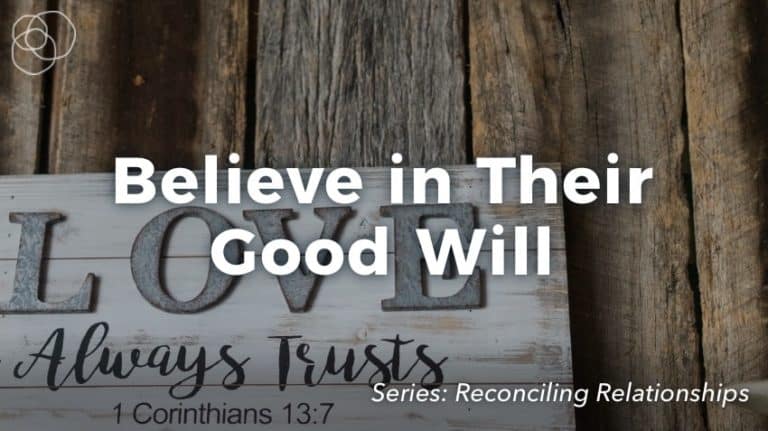
by Erin Bird
Have you ever found yourself in a strained relationship, if even for just a few moments? If you are married, have kids, have parents, have coworkers or classmates, or simply have friends, I can pretty much guarantee you have. Even the best of friendships experience moments of frustration. It might come from differing personalities, difficult circumstances, or just a bad night's sleep.
So what do you do when a relationship gets strained and is in need of reconciliation?
Years ago, I heard Emerson Eggerichs, author of the best-selling book Love & Respect, teach a four-week sermon series on the topic of relational reconciliation. His series (like his books and ministry) focused on marriage, but I believe the four principles he taught can be applied to most any relationship.
So we are going to take four weeks here on the blog to walk through Emerson's four-steps for how to bring reconciliation into any relationship. Here is what the series will look like:
Today - Believe in Their Good Will
July 4 - Lower Your Heart Rate
July 11 - Understand to be Understood
July 18 - Repair the Damage with Something Positive
If you notice the first letter of each topic, you will see it spells the word "BLUR". Dr. Eggerichs did this intentionally. When you are frustrated in a relationship, your thinking becomes "blurry." And in those blurry moments, your voice creeps upward in volume, or hurtful words start to form in your mind, or you find yourself wanting to do something drastic (like run away or get a divorce), or you just verbally or emotionally shut down.
So to help clear the emotional fog, let us learn and apply the BLUR principle, beginning today with B - Believe in Their Good Will.
For many of us, when we find ourselves in an argument, we don't just feel like the other person isn't listening to us, we actually believe they don't even love us. We take the argument very personally. And in our pain, we do hurtful things, whether by saying cruel words or completely shutting down on them.
But if you stop and think about it, the person you are arguing with probably didn't wake up that morning conspiring how they could ruin your life. (If they did, you and I need to have a completely different conversation about placing healthy boundaries in that relationship, and possibly even temporarily getting out of the relationship because of dysfunction or abuse.)
But if you can honestly ask yourself, "Does this person wish evil upon me?" and answer with a clear, "No,"you can begin to move on to the next part of the BLUR principle, "Lower Your Heart Rate" (which we'll talk about next week). This Sunday, we will see the Apostle Paul address two women in the church in Philippi who were having a conflict. He tells them to "agree in the Lord." In other words, he's saying to them "You are both Jesus-followers! So believe in the good will of the other and come together on your issue." Paul knew that when you realize the other person isn't trying to ruin your life by their differing opinion, perspective, or approach, but might actually be for you, it helps you begin to reconcile the relationship, getting out of the blurriness of the moment and back in harmony with the other person.
So when you find yourself wanting to yell at the people God has put in your life, or wanting to completely shut down to avoid an uncomfortable conversation, ask yourself "Does this person generally have my best interest in mind?" and if so, you can follow the B and believe in their good will.
Receive Riverwood's "News & Notes" weekly email in your inbox. Submit your email address below and stay in the loop.

We are on a mission to help people love like Jesus loved and live like Jesus lived.
It doesn't matter to us if you:
No matter where you are in your spiritual journey, we want to help you become who God has created you to be.